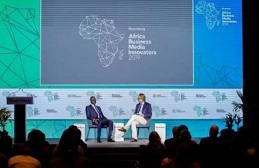Bloomberg Africa Business Media Innovators” Forum 2023 is set to convene leaders from across Africa and internationally. Media, business, government, technology, and community leaders from across Africa, the USA and beyond will convene in Cape Town, South Africa to participate in the annual Africa Business Media Innovators (ABMI) forum on October 30 – November 1.
Co-hosted by M. Scott Havens, CEO, Bloomberg Media and Matthew Winkler, Editor-in-Chief Emeritus, Bloomberg News, and Erana Stennett, Corporate Philanthropy Middle East and Africa, Bloomberg. This year’s convening returns to South Africa, which was the inaugural host of ABMI in 2015, resuming in person for the first time since 2019. This sixth edition of the forum follows successful gatherings in Senegal (2019), Zambia (2018), Ghana (2017), Kenya (2016), South Africa (2015) and the virtual ‘ABMI Chats’ series in 2020 and 2021.
Leaders at this year’s convening will examine innovative business solutions re-shaping and contributing to the future of media and journalism both in Africa and globally. The gathering will provide a unique, forward-looking platform for actionable dialogue and peer-learning as media leaders in Africa prepare for journalism in the digital age.
M. Scott Havens, CEO, Bloomberg Media said: ‘Against the backdrop of a fragmented global media landscape and challenges to business models at both a local and global level, this forum provides an opportunity for fresh approaches, ideas and solutions to building sustainable media business models in Africa and beyond’.
Matthew Winkler, Editor-in-Chief Emeritus, Bloomberg News said: ‘ABMI comes at a time of growing optimism around Africa’s economic potential and aims to act as a platform for action to catalyse investment, growth, and development by contributing to the strengthening of business and financial reporting on the continent’.
This year’s convening focuses on the opportunities and challenges shaping the future of media in Africa. Key themes to be explored include the impact of new technologies, AI, and the future shape of work in newsrooms, along with a focus on the sustainability of legacy media across the continent against the backdrop of increased global competition. There will also be analysis of the current state of the media landscape in Africa and globally.
Speakers at this year’s forum include:
Tomiwa Aladekomo, CEO, Big Cabal,
Styli Charalambous, CEO, Daily Maverick,
Paul Cheung, Chief Executive Officer, The Center for Public Integrity
Thembisa Faukude, CEO, Mail & Guardian
Koyo Kouoh, Executive Director, and Chief Curator, Zeitz MOCCAA
Prof. Lesley Lokko, Founder, African Futures Institute
Nyimpini Mabunda, CEO, General Electric Southern Africa
Jocelyne Muhutu-Remy, Managing Director, Africa and the Middle East, Spotify
Nobel Laureate Maria Ressa, Co-Founder and CEO, Rappler
Pamella Sittoni, Executive Editor and Managing Editor, The Nation Media Group
Monde Twala, Senior Vice President & GM Paramount Africa & Lead BET International, Paramount International
The annual event is a component of the Bloomberg Media Initiative Africa (BMIA), a pan-African program launched by Michael R. Bloomberg in 2014. The initiative is designed to advance business journalism in Africa and accelerate development of a globally competitive media and financial reporting industry.
The program delivers cross-disciplinary educational programs and mid-career fellowships to increase the number of highly trained business and financial journalists, as well as supports research to stimulate new media innovations.
It is also designed to convene leaders to promote interactive dialogue and build strong relationships to enhance the quality of financial coverage and the availability of reliable and timely data on the continent.
Earlier this month, Bloomberg expanded its executive education program in business and financial journalism, BMIA Financial Journalism Training (FJT), to Cote d’Ivoire and Senegal. Offering the program in French for the first time, more than 100 delegates joined the new training cohorts. This follows the successful implementation of the program in Ghana, Tanzania, Zambia, Nigeria, Kenya and South Africa. To date, the FJT program has reached 800 participants from 16 countries across the Continent.

